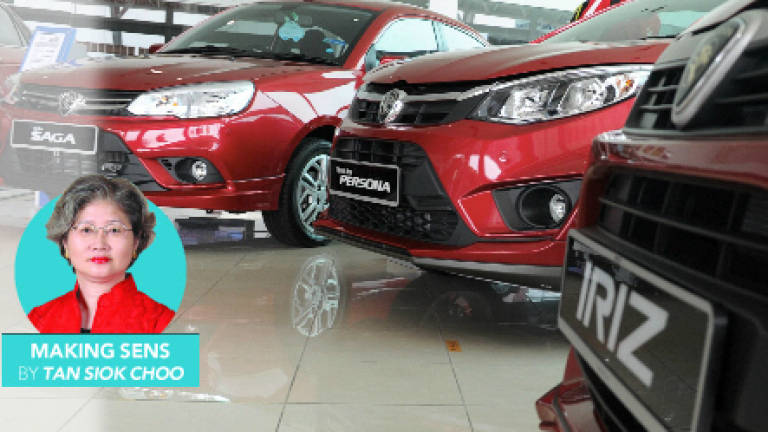A turbo-charged joint venture?

POSSIBLY in less than two weeks, China's Zhejiang Geely Holding Group (Zhejiang) is expected to announce its nominee to become chief executive officer (CEO) of Perusahaan Otomobil Nasional Sdn Bhd, the wholly-owned manufacturing arm of Malaysian carmaker Proton Holdings (Proton). A Fortune 500 company, Zhejiang's subsidiary is Geely Auto Group (Geely).
This nomination could signal completion of the foreign strategic partnership (FSP) between Proton's parent DRB-Hicom and Zhejiang. Hopefully, this will also tone down the decibel level from critics opposed to the sale of a 49.9% stake in Proton to Zhejiang while DRB-Hicom retains a majority stake of 50.1% share.
Critics of the FSP fall into two broad categories – nationalists who oppose the sale of Proton to a foreign entity, arguing Malaysia's first national carmaker should continue going it alone, and those who support Proton teaming up with a foreign car manufacturer but claim Zhejiang isn't the appropriate joint-venture partner.
Nationalists who argue Proton should continue to remain wholly Malaysian-owned wilfully ignore several facts. Since Proton's establishment in 1983, the federal government has provided the car company with about RM13.9 billion in grants and other assistance, including taxes foregone, International Trade and Industry Minister Datuk Seri Mustapa Mohamad said in a statement in April.
Mustapa noted the auto industry is "extremely competitive", requiring high capital resources for research and development while scale is also crucial. "Proton currently has neither of them," he stated bluntly.
A clutch of statistics underscores Proton's decline. Its market share has fallen from a peak of 74% in 1993 to 13% in the first half of this year (1H 2017). Although Perodua was established 10 years later than Proton, the second national car manufacturer enjoys stronger sales.
Last year, Proton sold 72,290 units – about 35% of Perodua's sales of 207,110 cars. Although Proton's performance improved slightly in 1H 2017 with sales of 39,393 cars, this comprised about 40% of Perodua's sales of 99,675 cars.
Despite setting up a car company earlier than its neighbours, Malaysia remains a laggard. In 2015, Malaysia's output totalled 614,671 vehicles compared with Indonesia's 1.1 million cars while Thailand outpaced both countries with 1.9 million units, data from the Organisation Internationale des Constructeurs d'Automobiles (OICA) show.
Commentators suggesting a Chinese car manufacturer is the wrong partner for Proton are living in the auto world's Jurassic age – an era where the United States was the world's largest car market. In 2015, China produced 24.5 million cars, more than double the American output of 12.1 million cars, OICA figures show.
Although Zhejiang and Geely are unknown corporate entities for most Malaysians, both parent and subsidiary enjoy several distinctions.
First, Geely isn't a state-owned enterprise but a private car company. Started in 1986 by Li Shu Fu as a refrigerator parts manufacturer, it is now the second-largest wholly Chinese marque, The Economist magazine says.
Second, Geely has no joint ventures with foreign companies in China and has "had to rely on its own independent car-making expertise", The Economist adds.
Third, Zhejiang bought 100% of Volvo Cars for US$1.8 billion in 2010, the biggest purchase by a Chinese carmaker. Unlike many other Chinese acquirers of foreign trophy assets, Zhejiang paid significantly less than the US$6.4 billion Ford forked out for the Swedish auto company in 1999.
Fourth, Geely is a forward-looking carmaker. In November 2015, the Chinese automaker launched its first pure electric car, the Emgrand EV. Simultaneously, it also unveiled an ambitious Blue Geely initiative – by 2020 90% of the Chinese auto company's output will comprise new energy vehicles, of which 65% will be hybrids and 35% pure electric.
Fifth, Geely's car sales in China and its profits have been accelerating. Last year, its China car sales zoomed by 50% to 766,000 vehicles while net profit more than doubled to 5.1 billion renminbi (RM3.2 billion), its strongest growth since 2008, Fortune says.
Earnings growth is expected to remain strong this year. A Reuters poll of analysts estimated net profits could rise by 37% to 7 billion renminbi (RM4.4 billion) this year.
Sixth, remarkably, Zhejiang has been lauded by Bloomberg for its "careful husbanding of engineering and executive talent at Volvo and other acquisitions".
In 2006, Zhejiang initially acquired a 20% stake in London Taxi Co before taking full ownership in 2013 of the firm that produces the UK capital's iconic black taxis.
"Volvo has been thriving (under Zhejiang) which appears to operate on the seemingly revolutionary principle that the parent company provides cash while the existing engineering and design teams get on with what they do best," a Bloomberg article noted.
With Geely as a foreign strategic partner, Proton has chosen a company that provides access to the world's largest car market, has a track record of successful joint ventures with foreign marques and offers a turbo-charged future.
Opinions expressed in this article are the personal views of the writer and should not be attributed to any organisation she is connected with. She can be contacted at siokchoo@thesundaily.com